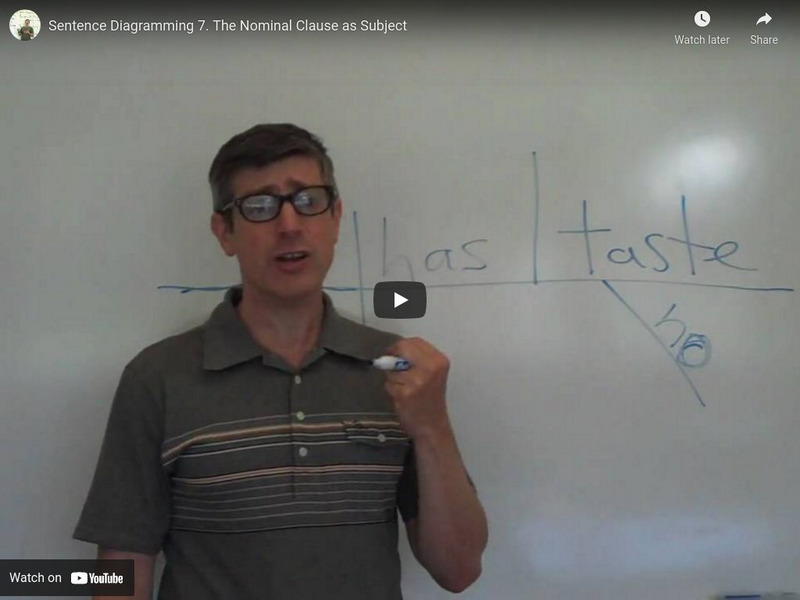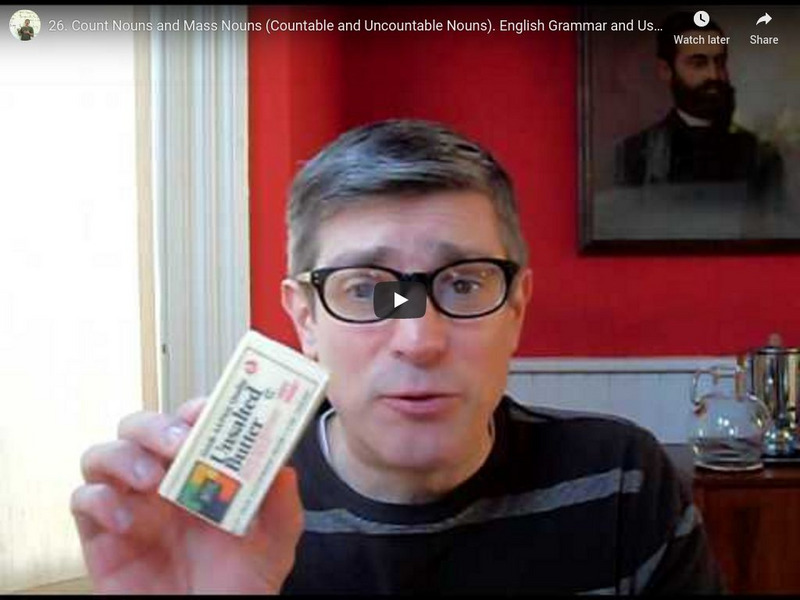Hi, what do you want to do?
Ereading Worksheets
Singular, Plural, and Possessive Nouns | Parts of Speech App
Give your noun instruction a boost, with an in-depth presentation into singular, plural, and possessive nouns. First, enthusiastic grammarians learn about each noun in detail; then, take part in an interactive pop quiz, and end the...
Curated OER
Abstract and Concrete Nouns
There is no way your class won't understand the differences between abstract and concrete nouns after watching this super cute video. They'll see first hand that love is abstract but hands are concrete, happiness is abstract while a ring...
Curated OER
Prepositions - English Grammar #1
Discover how to use prepositions in order to talk about location and direction. Definitions of prepositions, prepositional phrases, noun phrases, and more are given. Separate prepositions are then discussed and used in sentences....
Curated OER
Prepositions - English Grammar #2
Continue learning about prepositions of location and direction in part two with Jennifer. Different prepositions are discussed with the same fill-in-the-blank format from part one. The video ends with questions where the viewer chooses...
Curated OER
Prepositions - English Grammar #3
Finish the series on prepositions of location and direction in this video. Direction and location are distinguished with a description and a vignette at the local playground. Viewers then see a statement and choose the correct...
Curated OER
IELTS Writing Essays 7
Lewis continues his look at persuasive strategies in writing, especially as they pertain to the IELTS essay. The focus narrows in even more on conjunctions and logic. Typical errors are shown.
Curated OER
IELTS Writing Essays 6
Be more persuasive with these strategies! Specific to the IELTS essay, Robert Lewis talks about persuasive techniques, such as using reason and appeal to authority, and how to apply them to your writing.
Yossarian the Grammarian
Gerunds and Gerund Phrases: English Grammar Lesson
This video lesson from Yossarian the Grammarian explains what gerunds are. He also explains how gerunds function in a sentence. [5:16]
Yossarian the Grammarian
Sentence Diagramming 7: The Nominal Clause as Subject
This video lesson from Yossarian the Grammarian explains how to diagram a sentence that has a nominal clause that functions as the subject of the sentence. [2:16]
Yossarian the Grammarian
Count Nouns & Mass Nouns: Countable & Uncountable Nouns
This video lesson from Yossarian the Grammarian explains how to distinguish between using a "count noun" or a "mass noun" in the sentence.
University of Texas at Austin
Spanish in Tx: Cuando Nos Reunimos, Es Como Que Si Estuvieramos en El Salvador
Students can listen to a video interview [2:16] with a native Spanish speaker who is from El Salvador and is living in America. This interview, conducted in Spanish, explains what she and her family do to keep their religious traditions...
University of Texas at Austin
Spanish in Texas: Para Mi Mama, Con El Poder De Dios Se Puede Todo
Students can listen to a video interview [2:56] with a native Spanish speaker who is from El Salvador and is living in America. This interview, conducted in Spanish, explains what she does to keep her traditions alive while living in...
Khan Academy
Khan Academy: Introduction to Singular and Plural Nouns
What is the difference between singular and plural nouns? How can I make a noun plural? These questions are answered in this video by Khan Academy. The focus is on regular plural nouns with only a brief mention of irregular plural nouns.
Imagine Learning Classroom
Learn Zillion: Using Abstract Nouns Properly
Writers use abstract nouns to show clear ideas in their writing. Let's practice using abstract nouns to show ideas, feelings, and beliefs in our writing. The video defines abstract nouns and discusses examples in written text. [10:03]
Turtle Diary
Turtle Diary: Grade 1: Compound Words
This TurtleDiary interactive video lesson [0:47] features information about compound words. Games and worksheets are included to supplement this video lesson about compound words.
Turtle Diary
Turtle Diary: Collective Nouns
This video presents a thorough explanation of collective nouns, including what they are and how they are usually structured in a sentence. Plenty of examples support learning this concept.
Turtle Diary
Turtle Diary: Singular & Plural Nouns
This TurtleDiary video lesson [11:03] is designed for students to explore singular and plural nouns. Practice exercises, a video, and a lesson are included to supplement this singular and plural nouns lesson.
Sophia Learning
Sophia: Long Compound Noun Phrases
This slide show tutorial demonstrate issues with long compound nouns and why they should be avoided when possible.
Imagine Learning Classroom
Learn Zillion: Understand Nouns
To help students become familiar with nouns and their function in both the subject and predicate of a sentence. [8:26]
Imagine Learning Classroom
Learn Zillion: Use Appositives to Clarify Meaning and Add Interest to a Sentence
Writers use appositives to clarify meaning and add interest. Let's practice adding appositives to our sentences. [6:19]
NPR: National Public Radio
Npr Videos: Skunk Bear: Wanna Live Forever? Become a Noun
Joseph Guillotin, Henry Shrapnel and Jules Leotard became immortal -- by entering the English language. But when your entire life is reduced to a single definition, the results are sometimes upsetting. [3:16]
Khan Academy
Khan Academy: Introduction to Singular and Plural Nouns
Learn the difference between singular and plural nouns.
Khan Academy
Khan Academy: Introduction to Nouns
A noun is a word that describes a person, place, thing, or idea. Examples of nouns include names, locations, objects in the physical world, or objects and concepts that do not exist in the physical world; for example, a dream or a theory.
Khan Academy
Khan Academy: Common and Proper Nouns
What's the difference between a common noun and a proper noun?


























